| Srl | Item |
| 1 |
ID:
133845
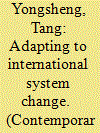

|
|
|
|
|
| Publication |
2014.
|
| Summary/Abstract |
Understanding the transition happening in the international system requires a balance between old logic and new reality. As the power pattern changes and the characteristics of international order unfold, the complications of global politics, casual relationships among different issues, and the echoing effects of strategic choices will lead to greater need for global governance. The logic of simple power politics will not be enough when strategists confront nontraditional challenges.
|
|
|
|
|
|
|
|
|
|
|
|
|
|
|
|
| 2 |
ID:
133849
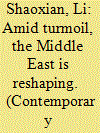

|
|
|
|
|
| Publication |
2014.
|
| Summary/Abstract |
Turmoil in Iraq reached a new level when ISIL seized Mosul after the Iraq security force collapsed on June 10. Although ISIL, the Islamic State in Iraq and the Levant , look after over Fallujah in early 2014, this latest development has deeper repercussions. On June 29, ISIL declared a large territory between Iraq and Syria a new state.
|
|
|
|
|
|
|
|
|
|
|
|
|
|
|
|
| 3 |
ID:
133841
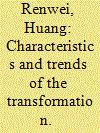

|
|
|
|
|
| Publication |
2014.
|
| Summary/Abstract |
The characteristics of the transformation of the contemporary international system are unprecedented since the birth of the Westphalian system, and even since the end of world war - II and cold war. The transformation of the contemporary international system is reflected firstly in the structural changes to international power, namely the transfer of power. The transfer of power and the transformation of the international order were accomplished through war throughout modern history
|
|
|
|
|
|
|
|
|
|
|
|
|
|
|
|
| 4 |
ID:
133855
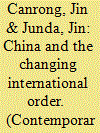

|
|
|
|
|
| Publication |
2014.
|
| Summary/Abstract |
From the beginning of 2014, the international order has undergone some quite dramatic changes in several parts of the world. The Ukrainian political crisis has gradually evolved into a U.S-Russia confrontation two decades after the end of cold war. In the Middle East, the extremist group, the Islamic State of Iraq and Al Sham (ISIS) invaded Iraq gaining much territory in the north of the country. Iraq has become a new unstable element in the Middle East. In Africa, the aftershock of the Arab Spring can be seen most prominently in Egypt and Libya. South Sudan and Central Africa are plagued by civil war. In the Asia-Pacific region Sino-Vietnam and Sino-Japanese Conflict have escalated and Japan has lifted a ban on collective self defence which threaten China's neighborhood security and regional stability.
|
|
|
|
|
|
|
|
|
|
|
|
|
|
|
|
| 5 |
ID:
133853
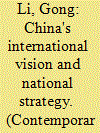

|
|
|
|
|
| Publication |
2014.
|
| Summary/Abstract |
The global order was set in place following the end of the Second World War by a consortium of western countries headed by the U. S. since then, major western countries have strived to maintain their long dominance in global politics and economics. With the rise of nationalist movements, former colonies gained their independence, and many developing countries joined the UN in recent years the economies of the emerging powers have grow rapidly and they have also joined WTO.
|
|
|
|
|
|
|
|
|
|
|
|
|
|
|
|
| 6 |
ID:
133852
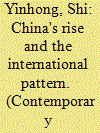

|
|
|
|
|
| Publication |
2014.
|
| Summary/Abstract |
Three basic elements stand out in the international pattern: global power distribution, the system of international norms and the transnational values systems, all of which are of vital importance in the interaction between China's rise and the future international pattern.
|
|
|
|
|
|
|
|
|
|
|
|
|
|
|
|
| 7 |
ID:
133837
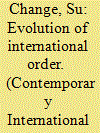

|
|
|
|
|
| Publication |
2014.
|
| Summary/Abstract |
Current international order results from accumulation of different kinds of order in history. They were interconnected regional orders of integrated civilizations centered on a core country.
|
|
|
|
|
|
|
|
|
|
|
|
|
|
|
|
| 8 |
ID:
133850
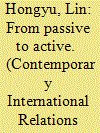

|
|
|
|
|
| Publication |
2014.
|
| Summary/Abstract |
As one of the victorious allies of World War - I, China attended the Paris Peace Conference in 1919. Toa certain extent, the conference can be regarded as the true beginning of global governance. It was followed by the establishment of the Versailles-Washington System. The first international pattern with world participation
|
|
|
|
|
|
|
|
|
|
|
|
|
|
|
|
| 9 |
ID:
133846
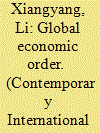

|
|
|
|
|
| Publication |
2014.
|
| Summary/Abstract |
After the end of the cold war, the global economy has been characterized by globalization. This is reflected in the growing transnational flow of goods, services and factors of production. It is also reflected in the global economic order and rules constraining transnational flows. Doubtless, the transnational flow of goods, services and factors of production can benefit participating countries.
|
|
|
|
|
|
|
|
|
|
|
|
|
|
|
|
| 10 |
ID:
133856


|
|
|
|
|
| Publication |
2014.
|
| Summary/Abstract |
Construction of a high-speed railway linking Europe, Asia, Africa and North and South America is a serious proposal that will profoundly impact international relations. Discussion of the internationalization of high-speed rail transportation is being led from the advanced position of China's well regarded achievements in this field. Global geopolitics and traditional geopolitics theories will also undergo revolutionary changes as cooperative planning proceeds.
|
|
|
|
|
|
|
|
|
|
|
|
|
|
|
|
| 11 |
ID:
133839
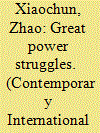

|
|
|
|
|
| Publication |
2014.
|
| Summary/Abstract |
International order is the norm, standards and corresponding guaranteeing mechanism, decision making process, and rule of procedures established by members of the international system to coordinate and deal with various international affairs, in order to maintain stability and the normal operation in the international system. As an international public product, international order is usually supported by the major actors of the international system.
|
|
|
|
|
|
|
|
|
|
|
|
|
|
|
|
| 12 |
ID:
133858
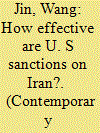

|
|
|
|
|
| Publication |
2014.
|
| Summary/Abstract |
U. S. sanction on Iran have expended since the start of the Iranian nuclear issue. They have grown from small scale embargoes to today's sanctions on multiple sectors including finance, trade, energy and personnel. During U. S. President Barak Obama's tenure, there is very little likelihood that the U. S will resort to force, leaving Washington with no other means than sanctions to persuade Iran to change its nuclear policy. This means that although sanctions have a limited effect, the US will continue primarily rely on them to force Iran's hand.
|
|
|
|
|
|
|
|
|
|
|
|
|
|
|
|
| 13 |
ID:
133854
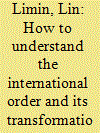

|
|
|
|
|
| Publication |
2014.
|
| Summary/Abstract |
What is the international order? Professor Zhoa Xiaochun define it as the standards and specifications established by the members of the international system in order to maintain its stability and normal operation as well coordinating and addressing international affairs, and acting as a guarantee mechanism, a decision making process and providing rules of agenda.
|
|
|
|
|
|
|
|
|
|
|
|
|
|
|
|
| 14 |
ID:
133842
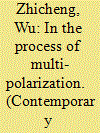

|
|
|
|
|
| Publication |
2014.
|
| Summary/Abstract |
The international system is the relatively stable framework of international relations constituted by various international actors, and represented by the great powers. The various international actors interact with one another in the framework. Therefore, against the current background of deepended globalization.
|
|
|
|
|
|
|
|
|
|
|
|
|
|
|
|
| 15 |
ID:
133844
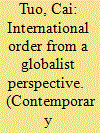

|
|
|
|
|
| Publication |
2014.
|
| Summary/Abstract |
In his book the Anarchical society : A study of order in world politics, Hedley Bull defined international order as a behavior pattern resulting from pursuit of purposes by nations or international community.
|
|
|
|
|
|
|
|
|
|
|
|
|
|
|
|
| 16 |
ID:
133847
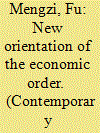

|
|
|
|
|
| Publication |
2014.
|
| Summary/Abstract |
In general, any regional order or international order depends on the strategies of major powers. The order arises because power have chosen it while it is passively accepted by other parties. International orders are relatively stable. The current international order under the UN framework as the principal axis was formed after the Second World War. Our principles of peace and development have been set within it, and the behavior and legal norms of sovereign nations within international relations are meant to comply with it.
|
|
|
|
|
|
|
|
|
|
|
|
|
|
|
|
| 17 |
ID:
133836
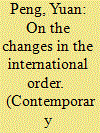

|
|
|
|
|
| Publication |
2014.
|
| Summary/Abstract |
A debate on the controversial issue of the international order has been the vogue in current times. To China high on the agenda in the defence of the post-war international order, as the Abe administration denies Tokyo's past aggression by paying homage to the Yasukuni shrines (where ashes of 14 class-A war criminals are honored), and appears to be reinterpreting its pacifist constitution in a bid to lift the ban on collective defence.
|
|
|
|
|
|
|
|
|
|
|
|
|
|
|
|
| 18 |
ID:
133848
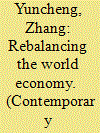

|
|
|
|
|
| Publication |
2014.
|
| Summary/Abstract |
China - US economic cooperation is at a critical stage, with both countries pushing their own economic restructuring in different ways. While the US has proposed a rebalancing strategy to promote its economic recovery, aiming to achieve a rebalancing not solely driven by consumption, China recognizes its need to achieve balanced economic growth and expending its domestics demand to substitute for a dependence on investment.
|
|
|
|
|
|
|
|
|
|
|
|
|
|
|
|
| 19 |
ID:
133840


|
|
|
|
|
| Publication |
2014.
|
| Summary/Abstract |
The current international order, especially regionally speaking is chaotic, with the following four main features:
First, the great game between the US and China is the key driver behind contemporary change to the international order. Both China and the US are big powers with global influence : One is the biggest power trying to maintain the status quo while the other is the biggest emerging power- according to world bank's latest report of April 30, 2014, China is predicted to becomes the world's largest economic entity in 2014 on the basis of purchasing power parity (PPP).
|
|
|
|
|
|
|
|
|
|
|
|
|
|
|
|
| 20 |
ID:
133843


|
|
|
|
|
| Publication |
2014.
|
| Summary/Abstract |
The author believes that strategic choice of states lies behind the shape of the international order. Originally, the western mainstream theories stress that anarchy is the primary and prerequisite to international relations. It determines strategic choice of states that shapes the international system, promotes its transformation and, therefore, bring about characteristics of the international order.
|
|
|
|
|
|
|
|
|
|
|
|
|
|
|
|